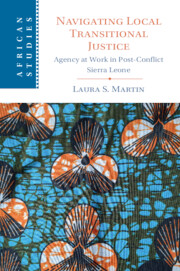Book contents
- Navigating Local Transitional Justice
- African Studies Series
- Navigating Local Transitional Justice
- Copyright page
- Dedication
- Contents
- Maps
- Acknowledgments
- 1 Agency in Times of Transitional Justice
- 2 Navigating Violence, Peace and Justice
- 3 Deconstructing Fambul Tok’s Discourse and Practice
- 4 Participant Experiences with Fambul Tok’s Program
- 5 Unrecognized Mechanisms, Normality and Everyday Realities in Transition
- 6 Activating Justice
- Appendix A: Informant Interview List
- References
- Index
- African Studies Series
3 - Deconstructing Fambul Tok’s Discourse and Practice
The Local, Ownership and Participation
Published online by Cambridge University Press: 13 July 2023
- Navigating Local Transitional Justice
- African Studies Series
- Navigating Local Transitional Justice
- Copyright page
- Dedication
- Contents
- Maps
- Acknowledgments
- 1 Agency in Times of Transitional Justice
- 2 Navigating Violence, Peace and Justice
- 3 Deconstructing Fambul Tok’s Discourse and Practice
- 4 Participant Experiences with Fambul Tok’s Program
- 5 Unrecognized Mechanisms, Normality and Everyday Realities in Transition
- 6 Activating Justice
- Appendix A: Informant Interview List
- References
- Index
- African Studies Series
Summary
This chapter begins exploring Fambul Tok’s program. It looks at how the organization illustrates the different ways they project themselves as local and what this says about the reproduction of common local tropes by people who know and understand this vernacular, namely by highlighting national identity – Sierra Leonean – and cultural and traditional practices by examining the materials they produced. This is contrasted with ethnographic observations, which explored how the organization actually operated on a daily basis, looking in particular at the interactions and hierarchies both within the organization, between staff and program participants. Exploring these interactions demonstrates how local transitional justice organizations also create and reinforce internal societal hierarchies, mirroring international-local hierarchies. Thus, knowledge of transitional justice and how the local is constructed within TJ programs is its own form of power. Exploring how the agency is employed by different people in different contexts enriches how we understand the micro-dynamics of power, knowledge and discourse within post-conflict contexts.
Keywords
- Type
- Chapter
- Information
- Navigating Local Transitional JusticeAgency at Work in Post-Conflict Sierra Leone, pp. 68 - 95Publisher: Cambridge University PressPrint publication year: 2023

